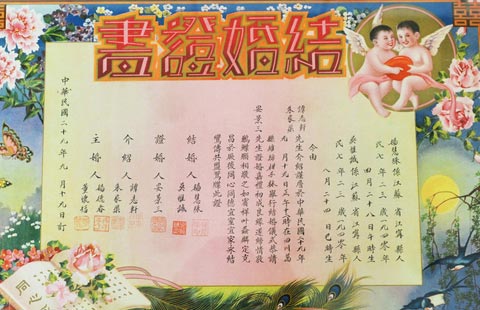Heat-resistant gene could help crops cope with global warming, scientists say
Updated: 2015-08-21 07:39
By Zhou Wenting in Shanghai(China Daily)
|
||||||||
Shanghai scientists have found a gene that provides crops with a higher resistance to heat, offering a potential boon to farmers coping with reduced yields in the face of global warming.
The discovery, made after 10 years of study by the Institute of Plant Physiology and Ecology, a branch of the Shanghai Institutes for Biological Sciences of the Chinese Academy of Sciences, was published on Monday on the website of the scientific journal Nature Biotechnology.
"When the activity of the gene ERECTA is increased, it's like a layer of sunscreen cream applied to the membrane of cells in a plant," said He Zuhua, the team's lead scientist. "Thus the cell membrane will become stronger under heat and the cells are more protected from death."
"As cells of a plant become less vulnerable to heat, the plant will grow bigger and turn out a higher yield of seeds," he said.
Agricultural experts said the discovery was a breakthrough toward increasing the yield of agricultural crops as Earth warms. The world's grain output has been on a decrease since 1961, according to a 2013 report in the journal Frontiers in Plant Science.
In Shanghai during the summer of 2013, daytime temperatures exceeded 40 C on at least five days, and large quantities of crops were scorched in the municipality and the neighboring provinces.
Researchers first made experiments on arabidopsis, a small flowering plant related to cabbage and mustard. The plant usually dries out and dies in 48 hours at 40 C. However, it became more heat-resistant when the activity of the gene was increased, and its yield increased by 30 percent to 45 percent.
Scientists later found that the gene treatment also worked for rice and tomatoes, which are likewise vulnerable to heat. It's universally believed that rice yields decline by 10 percent for each increase in temperature of 1 degree C.
Usually rice dries out and dies when the ambient temperature reaches 42 C, but rice treated in the experiment had a survival rate of 70 percent.
Field experiments
The theory has also been proved by three years of field experiments in Shanghai and Wuhan in Hubei province, scientists said.
The team also found that when the activity of the gene is increased in a crop, it will be more resistant to pests, disease and drought.
"It brings an important way of thinking to ameliorate the breed of some agricultural food in the world, and the editor's review from Nature Biotechnology recognizes the significance of the findings, because the treatment can be applied to almost all the plants," He said.
"Cultivating some new varieties may be of strategic importance to our country, since we have 22 percent of the world's population but only 7 percent of the agricultural area," he said.
zhouwenting@chinadaily.com.cn
(China Daily 08/21/2015 page4)

 Stars in their eyes: leaders in love
Stars in their eyes: leaders in love
 A survival guide for singles on Chinese Valentine’s Day
A survival guide for singles on Chinese Valentine’s Day
 Beijing police publishes cartoon images of residents who tip off police
Beijing police publishes cartoon images of residents who tip off police
 Rare brown panda grows up in NW China
Rare brown panda grows up in NW China
 Putin rides to bottom of Black Sea
Putin rides to bottom of Black Sea
 The changing looks of Beijing before V Day parade
The changing looks of Beijing before V Day parade
 Nanjing displays ancient marriage, divorce certificates
Nanjing displays ancient marriage, divorce certificates
 Top 10 Android app stores in China
Top 10 Android app stores in China
Most Viewed
Editor's Picks

|

|

|

|

|

|
Today's Top News
Chemical plants to be relocated in blast zone
Giant panda Mei Xiang at US zoo expected to give birth soon
S Korean president to participate in China's war anniversary
Thucydides Trap not relevant to today's Sino-US ties: Opinion
Fitch warns insured losses from Tianjin explosions could reach $1.5b
Conflicting reports on possible Abe trip
Hillary Clinton breaks with Obama on Arctic oil drilling
At UN, China backs regional peace efforts
US Weekly

|

|






